EPA Collaboration with Singapore
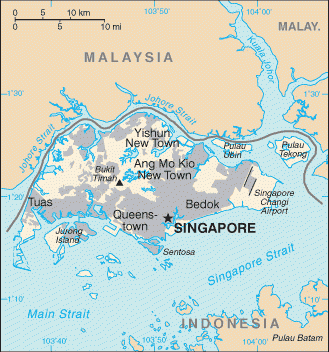
Demonstrating Leadership in Environmental Protection
Singapore, a small nation of 700 square KM, plays a large role in environmental leadership in the region. EPA and Singapore are cooperating to enforce environmental laws, improve air quality, protect drinking water, and reduce exposure to toxic chemicals. This cooperation helps to implement the U.S.-Singapore Environmental Plan of Action.
Explore our work in Singapore:
- Building Strong Institutions and Legal Structures
- Improving Air Quality for a Healthier Tomorrow
- Expanding Access to Clean Water
- Reducing Exposure to Toxic Chemicals
Building Strong Institutions and Legal Structures
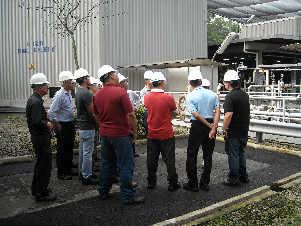 EPA officials lead an environmental inspections training in Singapore in May 2013.
EPA officials lead an environmental inspections training in Singapore in May 2013.Singapore and EPA recognize the importance of effective enforcement of environmental law. In 2013, EPA and Singapore National Environment Agency partnered to strengthen environmental inspections in Singapore with an environmental inspections training course, provided to approximately 50 officials from NEA. Course participants learned practical principles and skills for conducting environmental inspections. This course led Singapore to consider revisions to their inspector training curriculum.
EPA and Singapore National Environment Agency (NEA) are also active in the Asian Environmental Compliance and Enforcement Network (AECEN), which brings together enforcement officials from 13 countries to improve compliance with environmental laws and policies in Asia.
Learn more:
- Singapore National Environment Agency Exit
- Asian Environmental Compliance and Enforcement Network Exit
Improving Air Quality for a Healthier Tomorrow
Monitoring Air Quality: According to the World Health Organization, Exit urban air pollution levels have increased by more than 5% in over two thirds of the cities in South-East Asia. Air quality monitoring can provide important health information to the public. Since 2013, EPA has organized several technical discussions with Singapore’s National Environment Administration (NEA) on air quality monitoring, contributing to the revision of the country’s air quality monitoring standards.
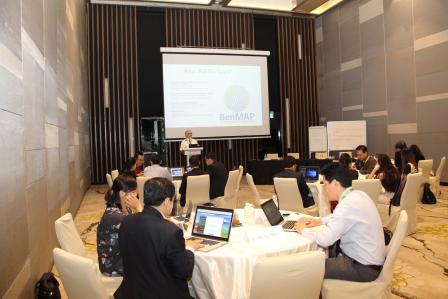 The U.S. and Singapore jointly deliver a training course on air quality and health in September 2016.
The U.S. and Singapore jointly deliver a training course on air quality and health in September 2016.Protecting Health: The World Health Organization estimates that urban air pollution caused 3.7 million deaths in 2012, over one-third of which were in Southeast Asia. To raise awareness about the linkages between air quality and health, in 2015 and 2016 EPA was part of a joint U.S. and Singaporean team which trained Southeast Asian officials on tools to estimate the health impacts of poor air quality. These courses were part of the U.S.-Singapore Third Country Training Programme.
Learn more:
Expanding Access to Clean Water
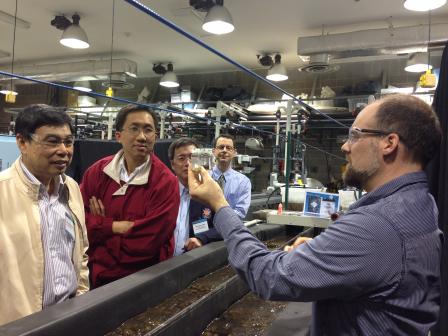 EPA and Singapore PUB discuss stream monitoring techniques.
EPA and Singapore PUB discuss stream monitoring techniques.According to the United Nations, the Asia-Pacific region is home to 60% of the world’s population, but it has only 36% of its water resources. In Singapore, most of the water supply is either imported or reclaimed through methods like desalination.
Since 2013, EPA and Singapore PUB (Singapore’s National Water Agency) have been supporting clean drinking water research in the U.S. and Singapore through collaboration and information exchange on topics such as water contamination detection, water reuse, and management of algal blooms. As part of this cooperation, in 2016, EPA partnered with ZWEEC (one of PUB’s private sector partners). EPA and ZWEEC are jointly assessing a new water monitoring technology that could quickly detect contamination in drinking water systems.
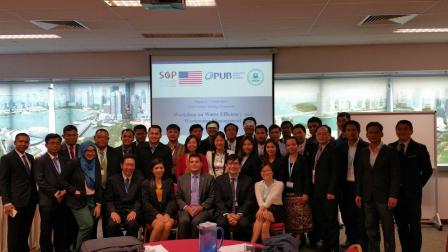 EPA and Singapore PUB deliver a training course on water efficiency and wastewater management in July 2016.
EPA and Singapore PUB deliver a training course on water efficiency and wastewater management in July 2016.- Recently: In September 2016, PUB participated in the Water Technology Innovation Cluster Leaders Meeting hosted by EPA and the Water Environment Federation. During the meeting, PUB shared their efforts to achieve water sustainability for Singapore, highlighting the link to economic growth and the importance of innovative solutions. The audience included approximately 100 individuals from nine different countries representing water clusters, water utilities, and various water technology businesses and organizations.
- Recently: In July 2016, Singapore PUB and EPA developed and delivered a training course on water efficiency and wastewater management for Southeast Asian countries. Through this course, participants learned about tools and strategies to treat wastewater and control water loss. The course was part of the U.S.-Singapore Third Country Training Programme.
Learn More:
- Memorandum of Understanding between EPA and the Singapore Public Utilities Board on Sustainable Urban Water Management (2013-2017)
- Singapore PUB Exit
- ZWEEC Exit
- U.S.-Singapore Third Country Training Programme Exit
Reducing Exposure to Toxic Chemicals
EPA and Singapore are committed to working together to protect our communities from toxic chemicals. EPA is combining our computational and toxicological expertise with the biomedical research capabilities of Singapore’s Agency for Science, Technology and Research (A*STAR). In 2016, EPA partnered with A*STAR to develop and use new approaches to evaluate the safety of chemicals, with a focus on developing predictive models for kidney, liver, and developmental toxicity. This collaboration aims to develop more efficient and economical ways to evaluate the potential health effects of chemicals to protect human health.
